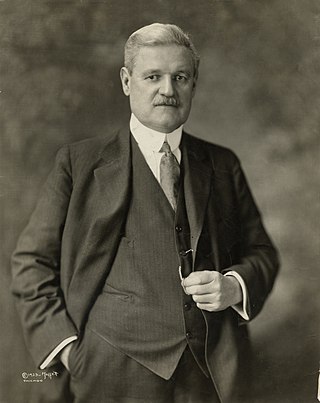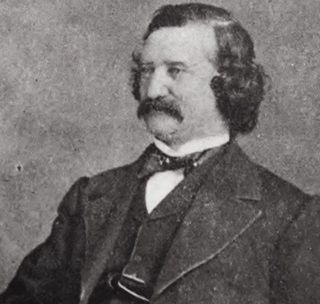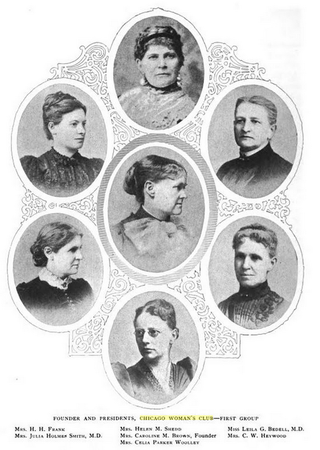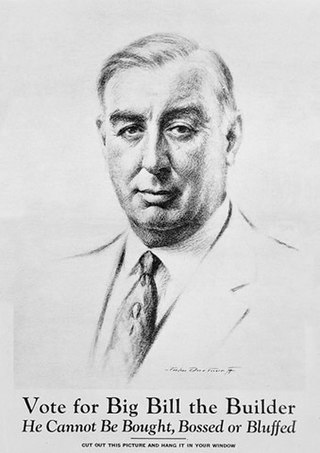
William Emmett Dever was the mayor of Chicago from 1923 to 1927. He had previously served as a judge and before that an alderman. As an alderman and judge he would work to become the Democratic candidate for mayor for over two decades.

Jacob Henry Schiff was a German-born Jewish American banker,businessman,and philanthropist. Among many other things,he helped finance the expansion of American railroads,and the Japanese military efforts against Tsarist Russia in the Russo-Japanese War.

His Honor,the Mayor,Thomas Hoyne,Esquire was elected Mayor of Chicago in 1876,but his election was later declared null and void by a Circuit Court. Prior to 1876,Hoyne had led a political career in which he had occupied numerous state and municipal offices.

The Chicago mayoral election of 1983 was first the primary on February 22,1983,which was followed by the general on April 12,1983. The election saw the election of Chicago,Illinois' first African-American mayor,Harold Washington. Incumbent Mayor Jane Byrne,who had served since April 16,1979 had lost re-nomination in the Democratic primary in a three-way race between herself,then–Congressman Washington,and then–State's Attorney Richard M. Daley in February 1983. Washington would face off against Republican nominee Benard Epton,winning with a 3.7% lead over Epton in the general election.

Charles Ernest Chadsey was an American educator and school administrator. He served as superintendent of city schools in Chicago,Detroit,and Denver,and Durango.

The Chicago Woman's Club was formed in 1876 by women in Chicago who were interested in "self and social improvement." The club was notable for creating educational opportunities in the Chicago region and helped create the first juvenile court in the United States. The group was primarily made up of wealthy and middle-class white women,with physicians,lawyers and university professors playing "prominent roles." The club often worked towards social and educational reform in Chicago. It also hosted talks by prominent women,including artists and suffragists.

The 1927 Chicago mayoral election was held on April 5. Democratic incumbent William Emmett Dever was defeated by Republican candidate William Hale Thompson,who had served as mayor from 1915 to 1923. Former health commissioner John Dill Robertson,who had been allied with the ex-mayor,broke with Thompson to run on his own and received more than five percent of the vote. It remains as of 2019 the last Chicago mayoral election not won by a Democrat.

Dorsey Ryan Crowe was an American politician who served as alderman of Chicago's 21st ward from 1919 to 1923 and upon its redistricting into the 42nd ward from 1923 to his death. A Democrat serving most of the Near North Side,he represented such affluent constituencies as the Gold Coast and Streeterville as well as such poor areas as Cabrini–Green and Goose Island. At the time of his death he was the Dean of the Chicago City Council,as well as the last alderman from the era of partisan aldermanic elections and when wards elected two aldermen each. An alderman for 43 years,and the last to have served under a Republican mayor,he is as of 2018 the third-longest serving alderman in Chicago history,behind Ed Burke of the 14th ward and John Coughlin of the 1st.

The 1931 Chicago mayoral election was held to elect the Mayor of Chicago. Former Cook County Board of Commissioners President Anton Cermak defeated incumbent mayor William Hale Thompson by a 17-point margin of victory.

Chicago has held regularly-scheduled popular elections to select the city's mayor ever since it was incorporated as a city in 1837.

In the Chicago mayoral election of 1919,Republican William H. Thompson won reelection,winning a four way race against Democrat Robert Sweitzer,independent candidate Maclay Hoyne,and Cook County Labor Party candidate John Fitzpatrick.

In the Chicago mayoral election of 1923,Democrat William E. Dever defeated Republican Arthur C. Lueder and Socialist William A. Cunnea. Elections were held on April 3,the same day as aldermanic runoffs.

John Dill Robertson was a medical professional and politician. He served as Chicago city health commissioner,president of the Chicago Board of Education,and president of the Chicago West Parks Board. In 1927,Robertson ran a third-party campaign for Chicago mayor. As a politician,Thompson was affiliated with the Republican Party. He was an ally of Republican boss Frederick Lundin,and prior to his 1927 mayoral campaign against him,had also long been an ally of William Hale Thompson.

The Chicago Board of Education is led by a president. The current President of the Chicago Board of Education is Miguel del Valle.

William McAndrew Jr. was an American educator and editor who served as Superintendent of Chicago Public Schools in the 1920s. McAndrew was,for a time,one of the best-known educators in the United States.

The New York City mayoral election of 1933 took place on November 7,1933 in New York City. Incumbent Democratic Mayor John P. O'Brien,who was elected in a special election after the resignation of Mayor Jimmy Walker,faced Republican Congressman and 1929 mayoral candidate Fiorello La Guardia,and former acting mayor and President of the New York City Board of Aldermen Joseph V. McKee,who became acting mayor after Walker's resignation until the special election,and ran on the Recovery Party line.
The Chicago Teachers Federation was a teachers union in Chicago Illinois that was founded in 1897. It is considered a predecessor of today's Chicago Teachers Union.

Albert Grannis Lane,was an American educator who served as superintendent of Chicago Public Schools,Cook County superintendent of public instruction,and president of the National Education Association.
On August 29,1927,Superintendent of Chicago Public Schools William McAndrew was suspended from his position by the Chicago Board of Education pending an administrative hearing by the board,being charged with "insubordination" for opposing a school board action that he believed would amount to reviving patronage in the school system. The administrative hearing,which was widely dubbed a "trial",was to determine whether he was guilty,and should therefore be removed from his office. The administrative hearing,which attracted great national media fascination and derision,took place over the course of several months,and saw McAndrew tried for counts of insubordination,and an additional count of conduct incompatible with and in violation of his duty. The hearing was effectively a show trial. After the first several weeks of the hearing,McAndrew and his legal team refused to attend any further sessions and he was tried in absentia. The school board found McAndrew guilty by an 8–2 vote on March 21,1928. In December 1929,the Superior Court of Cook County voided this,ruling that McAndrew had not been insubordinate,and that the school board had no authority to charge McAndrew for being "unpatriotic".

The William Hale Thompson 1927 mayoral campaign was the successful campaign of Republican William Hale Thompson for a third nonconsecutive term as mayor of Chicago in the 1927 Chicago mayoral election. The campaign saw him defeat incumbent Democrat William Emmett Dever,as well as a third-party effort by John Dill Robertson.

















